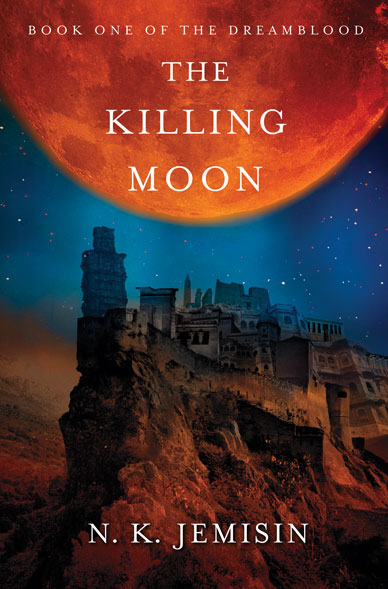 Ehiru is a Gatherer, collecting the dreamblood of souls for the good of his people, the people of Gujaareh. His deep devotion to the goddess Hananja has guided him in this job; he and the rest of Gujaareh's citizens live to keep peace in her name. But now, Ehiru's whole world is turned upside down. A Gathering gone wrong, forewarnings of corruption in their society... But are the warnings true?
Ehiru is a Gatherer, collecting the dreamblood of souls for the good of his people, the people of Gujaareh. His deep devotion to the goddess Hananja has guided him in this job; he and the rest of Gujaareh's citizens live to keep peace in her name. But now, Ehiru's whole world is turned upside down. A Gathering gone wrong, forewarnings of corruption in their society... But are the warnings true?
Alongside a spy from a neighboring city and his apprentice, Nijiri, Ehiru will discover horrifying secrets of his city-state and the strange being that roams it. All the while, debates concerning Gujaareh's use of magic flare. How can something so normal to Ehiru be so wrong in a foreigner's eyes?
The Killing Moon is the first novel of N.K. Jemisin's Dreamblood duology, the second being The Shadowed Sun (which also has a beautiful cover). I discovered this novel on Goodreads some months ago, and of course, the drop dead gorgeous cover attracted me to it, leading me to a most peculiar fantasy-oriented summary. Ever since then, I have needed to read this book.
Now that I've finally read it, I can definitely say that it's a very unique piece of fiction. I don't just mean that in terms of plot and magical elements, but I've simply never read a book set in a mock-Egyptian society. It was refreshing to be in such a different world, and Jemisin did a wonderful job crafting it. At the beginning of each chapter, a law of Gujaareh or a piece of wisdom is written before the scene begins, which helped us get to know the world she created even better. Plus, her writing style is just lovely; she definitely has a lot of skill in that department.
The characters really stood out as well, especially Ehiru and Nijiri. Both meant well and were guided by love for their goddess in addition to love for each other. But I must admit, their relationship confused me. They have a father/son relationship, yet they were also in love in a romantic way (mainly Nijiri). The idea of both relationships taking place at once made sense for their scenario, but it kind of freaked me out. I just can't imagine being in love with someone and then comparing them to a parent. But like I said, it does make sense for their particular scenario, whether anyone likes it or not.
Throughout the novel, there's a huge debate concerning the ways Gatherers use magic, and it parallels to debates on mercy-killing. Anyone reading this book won't be frustrated with this, because the author doesn't really force anyone to pick sides. We're dealing with prominent characters with differing opinions on the matter, and after a while, the problems with Gujaareh become bigger than this debate... Reapers are scary (though very interesting to read about).
Oftentimes when I was reading The Killing Moon, I kind of wanted more. There were just a few things that felt a little bit two-dimensional that primarily had to do with magic and dreamblood. I guess I just had a hard time picturing dreamblood, so I wanted to hear more about it on a physical, scientific level. That was probably my biggest complaint as I read. Anything else that seemed to fall flat was inflated in the end - the end of this book is definitely the best part. So much is explained that I didn't see coming! But the ending turned out to have emotional appeal as well. It made my heart sink a bit.
But this book has some interesting features after the story that I'd like to mention: A helpful glossary to guide us while reading (so we understand words like "dreamseed" and "jungissa") and a fun author interview. The author interview was particularly awesome because N.K. Jemisin got to interview herself, and she has a great sense of humor! A unique addition to a unique novel.
So overall, I'd say The Killing Moon has a lot to offer. I liked this book - it didn't strike me as 'Omg, this is mah new favorite!' or anything like that, it just has an excellent quality to it and I've never read anything like this before. N.K. Jemisin accomplished a lot with it, and anyone looking for a different kind of fictional world will find this refreshing.
But this book has some interesting features after the story that I'd like to mention: A helpful glossary to guide us while reading (so we understand words like "dreamseed" and "jungissa") and a fun author interview. The author interview was particularly awesome because N.K. Jemisin got to interview herself, and she has a great sense of humor! A unique addition to a unique novel.
So overall, I'd say The Killing Moon has a lot to offer. I liked this book - it didn't strike me as 'Omg, this is mah new favorite!' or anything like that, it just has an excellent quality to it and I've never read anything like this before. N.K. Jemisin accomplished a lot with it, and anyone looking for a different kind of fictional world will find this refreshing.
No comments:
Post a Comment